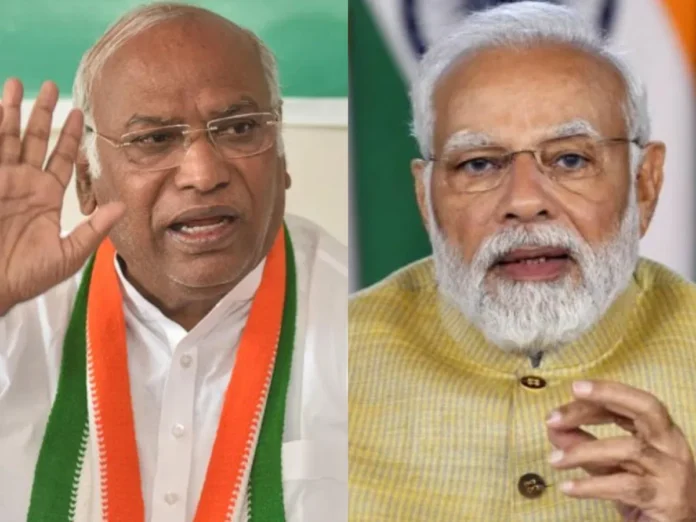Recent remarks by Mallikarjun Kharge, a veteran parliamentarian and senior Congress leader, have ignited a fresh wave of debate and scrutiny. Kharge’s pointed critique targeted none other than Prime Minister Narendra Modi, accusing him of prioritizing rhetoric over substance, particularly in the realm of economic policy and initiatives such as Make in India.
Addressing the Lok Sabha with characteristic candor, Kharge took direct aim at the Prime Minister’s penchant for grandiose speeches that, according to him, often lack tangible results. He minced no words in highlighting what he perceived as a glaring disparity between the Prime Minister’s rhetoric on issues like cultural symbolism and his administration’s track record on fostering indigenous manufacturing through initiatives like Make in India.
Kharge’s assertion that PM Modi focuses on topics like “mujra” and “mangalsutra” while sidelining crucial economic imperatives struck a chord with many, resonating beyond party lines. In a nation grappling with economic challenges exacerbated by the global pandemic, the need for substantive policies to boost domestic manufacturing and employment opportunities has never been more pressing.
Make in India, launched in 2014 with much fanfare, aimed to transform India into a global manufacturing hub, leveraging its vast pool of human capital and burgeoning consumer market. However, as Kharge pointedly noted, the program has fallen short of its lofty ambitions, failing to catalyze the anticipated surge in investment and job creation. Instead, critics argue, it has become emblematic of the government’s propensity for rhetoric over results.
Indeed, the efficacy of Make in India has been a subject of considerable debate, with detractors citing bureaucratic hurdles, regulatory bottlenecks, and a lack of robust infrastructure as key impediments to its success. While the initiative has undoubtedly spurred some investment and generated incremental gains in select sectors, its broader impact on India’s manufacturing landscape remains a matter of contention.
Kharge’s remarks serve as a timely reminder of the importance of holding elected leaders accountable for their promises and commitments. In a democracy, robust dialogue and constructive criticism are essential components of good governance, ensuring that policies are scrutinized and refined in the crucible of public discourse.
Moreover, Kharge’s critique underscores the imperative of prioritizing substance over style in governance, particularly in matters as critical as economic policy. While soaring rhetoric may capture headlines and stir emotions, it is tangible outcomes that ultimately determine the success or failure of government initiatives.
PM Modi’s administration would do well to heed Kharge’s admonition and redouble its efforts to translate rhetoric into reality, particularly in the realm of economic revival and job creation. The road ahead may be fraught with challenges, but it is only through concerted action and a commitment to genuine reform that India can truly unleash its full potential as an economic powerhouse.
In the final analysis, Kharge’s remarks should serve as a catalyst for introspection within the corridors of power, prompting leaders to reevaluate their priorities and refocus their energies on addressing the pressing needs of the nation. For in the crucible of public scrutiny lies the crucible of progress, where ideas are tested, policies refined, and the aspirations of a billion people find expression in the pursuit of a brighter tomorrow.
In response to Kharge’s critique, supporters of the Prime Minister have defended his administration’s efforts, pointing to initiatives such as Atmanirbhar Bharat and structural reforms aimed at bolstering the economy. They argue that while challenges persist, the government remains steadfast in its commitment to fostering economic growth and self-reliance. However, the debate sparked by Kharge’s remarks underscores the need for ongoing dialogue and accountability in shaping India’s economic future, ensuring that policies are responsive to the needs of all citizens.

